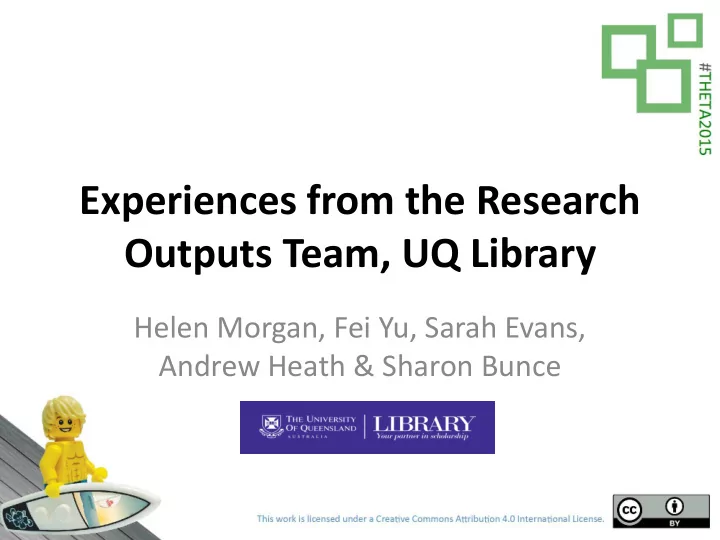

Experiences from the Research Outputs Team, UQ Library Helen Morgan, Fei Yu, Sarah Evans, Andrew Heath & Sharon Bunce
The Research Outputs Team – Knowledge Sharing and Training
Global drivers behind the formation of the Research Outputs Team
Andrew Helen Fei Sharon Sarah
Strategic Reports – Extreme Impact Metrics
Overview of service Bibliometrics service provides support to librarians • researchers • senior university management • Metrics data • used to inform university rankings • for other research evaluation exercises at whole-of-university level • often incorporated into briefing documents for senior executive staff of the university • forms a key part of the business intelligence of the organisation
Report samples – country report
Sample data
Other report types • School/Institute outputs and benchmarking data • UQ-U21 collaboration • EdX partnerships • Go8 Nature-Science publishing • ESI highly cited researchers Data sources: Web of Science & InCites v2 Scopus & SciVal
Creating an Australian Installation of the DCC’s DMP Online Tool
You Catch More Flies With Honey: Open Access Service at UQ
Open access at University of Qld …within 12 months of publication
Increasing OA content DOI via DOAJ (automatic) • Search links for DOAJ with no DOI • (automatic) Publisher version permitted for upload • (retrospective + ongoing) Publisher version available after • embargo Contact authors and UPOs for post • prints
Personalised OA content Information for Reporting • Compliance •
Moving forward – Linking grants with publications UQ UQ UQ Author Research Researchers eSpace App Master
UQ eSpace – Research Publication Information to Profile Research Performance
Custom Author & Org Unit Apps • Run off custom built institutional repository • Uses current author level data, fed from HR • Apps based on Scopus data, though Author app has Web of Science data incorporated in Dashboard • Old InCites Author Profile Dataset was used extensively until 2015
Org unit app – UQ Diamantina Institute
ORCiD implementation @ UQ
UQL took out premium ORCiD Membership mid 2014 (funded from the Library Collection Budget and supported by the ODVCR) Developing an application to allow UQ researchers to manage their author identifiers Author identity management will facilitate high quality metrics-based reporting provide researchers will a rich source of article level metrics based on integrated data
What will happen…… • Users can log into any of the following : – UQ eSpace (institutional repository) – UQ Author Statistics App via UQ eSpace – UQ Library website personalised home page
Users can easily see if they have signed up to author identifiers Note: name of researchers have been deleted in this slide
1. Researcher details will be pre-populated from UQ’s HR data – researcher may have to fill in any missing information 2. The API will create an ORCiD account and will send the researcher an email which they have to claim the account in 10 days. 3. ORCiD then included in UQ eSpace author profile.
1. API will search ORCiD for the researcher’s name and return possible matches 2. Researcher will select one and then the API will send user to ORCiD 3. User logsUser logs in and then redirects information (ORCiD) back to UQ via the API 4. ORCiD then included in author profile
Rolling out ORCiD • Created several hooks to make it easy • Users never have to enter in their ORCiD number • Soft launch – will target high profile researchers and all new researchers as part of induction process • Will encourage all RHD students to create an ORCiD – part of our scholarly publishing program • Work with the ODVCR to incorporate into HERDC, ERA and various training programs eg Essential Knowledge for Research Management Seminar
MyLibrary for Researchers
eSpace
Thank you Helen Morgan, Fei Yu, Sarah Evans, Andrew Heath & Sharon Bunce
Recommend
More recommend